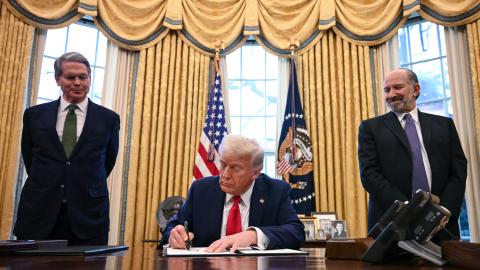If President Barack Obama is so bad on Israel, why are some of his most prominent Jewish critics planning on voting for him anyway? The list of these critics is long, but it includes former New York City Mayor Ed Koch, Harvard law professor Alan Dershowitz, and media tycoon Haim Saban. All three spent Obama's first term laying into the president on his Israel policy as if it were their litmus test--and all three are now publicly supporting his re-election.
Powerhouse lawyer Alan Dershowitz criticized Obama in the Wall Street Journal for not sending a tough enough message to the Iranian regime, and he even wondered openly if the president might be remembered as "the Neville Chamberlain of the 21st century."
However, it seems that Dershowitz was sufficiently impressed by Obama's seriousness regarding Iran when, in a personal meeting in the Oval Office, the president assured him, "I don't bluff." Now the professor is stumping for the president in Florida, and yesterday he officially endorsed him in the Jerusalem Post, writing that "the case for the reelection of Barack Obama is a compelling one, based not only on his past record but on the specific policies he has proposed for the next four years."
Ed Koch famously sent "a message to President Obama that he cannot throw Israel under the bus with impunity" last year in the New York Times. He ripped the president in 2010 when the administration made a big issue out of continued Israeli construction in East Jerusalem. "What they did is they wanted to make Israel into a pariah," he said of the White House. "It's outrageous in my judgment." Koch noted that he campaigned for Obama in 2008, and pushed Jews to vote for him, arguing he would be just as solid in his support for Israel as the Republican candidate, John McCain. "I don't think it's true anymore," said Koch.
But now the mayor is back in Obama's fold, if somewhat reluctantly, "I believe that he is going to win whether I vote for him or not," Koch told a radio interviewer in September. "So, wouldn't it be better that he wins changing his positions?"
In 2011, Haim Saban was angry with the administration for airing its grievances with Israel in public--and he went on CNBC to say so. Now that the election is around the corner, the Israeli-American billionaire is singing a different tune. The president's "support for Israel's security and well-being has been rock solid," Saban wrote in a heavily circulated New York Times op-ed last month. "What's the case against Mr. Obama? That he hasn't visited Israel since he was a candidate in 2008? Perhaps these critics have forgotten that George W. Bush, that great friend of Israel, didn't visit Jerusalem until his seventh year in office," Saban added. Somehow Saban seems to have forgotten that he is one of those critics.
So, what gives? Obama's record on Israel, as Koch, Dershowitz, and Saban have all helpfully pointed out, is not good. The president's strained relationship with Prime Minister Benjamin Netanyahu is unlikely to improve in a second term when Israeli-American relations will be more crucial than ever with Iran on the verge of nuclear breakout. Obama says he has Israel's back and reminds us regularly of the trip he took to Sderot as a candidate. But who can forget that he started his first term telling a group of Jewish leaders he invited to the White House that it was important to put daylight between the United States and Israel?
Maybe former Commentary editor Norman Podhoretz was right when he wrote after the 2008 election that no matter how dire the situation for Israel, Jews simply cannot bring themselves to vote for Republicans. As much as American Jews care, or claim to care, about the Jewish state, they are not one-issue voters. They care just as much, if not more, about issues that other liberal voters care about, like abortion and gay rights. (Podhoretz had hoped for "buyer's remorse" among Jews who supported Obama in 2008, but no such luck. The latest Gallup poll shows that Jewish voters are going for Obama over Mitt Romney 70 to 25.)
There's also the fact that the voting habits of Jews, like every other American who has ever stepped into a polling booth, are dictated as much by emotion and tradition as by reason. If you imagine your immigrant grandparents are watching you, it's a lot harder to pull the lever for the guy with the million-dollar country-club grin. Some will argue that this is what's going on with Dershowitz, Koch, and Saban.
The strictly political interpretation of their apparent flip-flop is that it allows them to be kingmakers of a sort. Koch has crossed party lines before: He backed George W. Bush for re-election in 2004, and his support for Bob Turner when he was running to replace Anthony Weiner in New York's ninth district might have helped put the Republican over the top. But if Koch did nothing but cross party lines, he'd make himself irrelevant within the party. Remaining a Democrat while criticizing the president makes him an unpredictable player that top Democratic officials have to keep happy.
But it may be that these pro-Israel democrats are playing a longer game with a far-seeing strategy. If Dershowitz and the rest were to leave the fold, the Democratic Party could shift policies, and possibly quite rapidly. That is, perhaps they're embracing Obama for the sake of the party--and so Israel continues to have support on both sides of the aisle.
Even before the founding of the Jewish state, the U.S.-Israel relationship has been based on strong bipartisan support. As I wrote in May, Israeli Prime Minister Bibi Netanyahu's late father Benzion pioneered this consensus, lobbying both sides of the aisle. AIPAC, of course, has institutionalized it, ensuring that the Jewish state has devoted friends everywhere on Capitol Hill.
Without that broad agreement--that Israel is a valuable strategic partner in a region of vital U.S. interest, and a friend with whom America has shared values and principles--the relationship would be buffeted by all of Washington's various political winds. By sticking with Obama in spite of all, Dershowitz and others are arguably protecting the bipartisan nature of the relationship, and at an especially vulnerable time.
Like many pro-Israel Democrats, Koch is still reeling from the chaos that broke out at the Democratic National Convention when Los Angeles Mayor Antonio Villaraigosa had to call for a floor vote three times to include recognition of Jerusalem as the capital of Israel in the party's platform. "Nobody," said Koch, "has adequately explained to me how the boos for God and Israel at the Democratic convention were louder than the cheers. How can that be?"
The issue, as Koch surely knows, is that the party's rank and file is shifting, with figures like Dershowitz and himself holding the line. And yet if the 2012 convention is any indication, the proudly pro-Israel wing of the Democratic party will, within a very short period of time, appear increasingly out of step. Saban and other prominent Jewish Democrats will be replaced by voices on the left who have made their hostility to Israel clear. Accordingly, the old guard seems to believe that while Obama isn't great for Israel, backing him is good for the health of the party and the Jewish state.
There's a place for voters for whom strong support of Israel is the key issue--and that's the Republican Party. But Israel's security has long depended on backing from both parties. Without it, the Jewish state will rapidly become a partisan issue, and Israel will invariably pay the price. At a moment when Israel needs strong U.S. support, Koch, Dershowitz, and Saban are looking to postpone that day of reckoning.

















